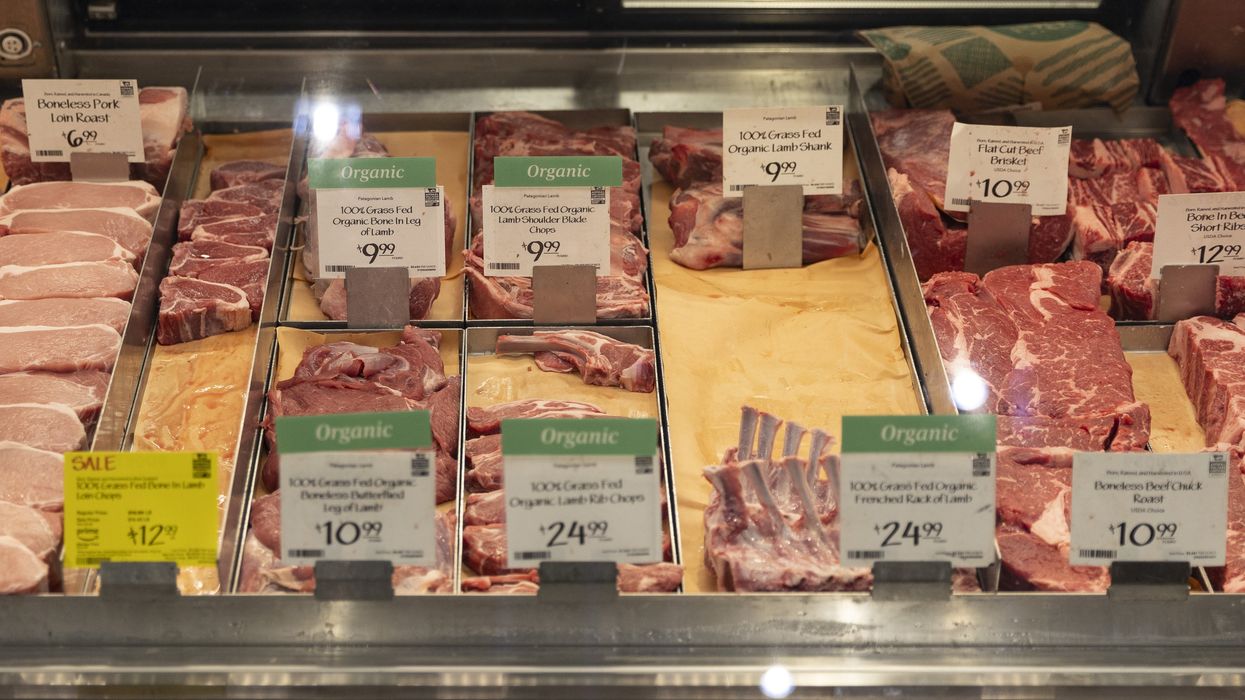Hill was policy director for the Center for Humane Technology, co-founder of FairVote and political reform director at New America. You can reach him on X @StevenHill1776.
Since the pandemic, going to the grocery store has become a jarring experience. On a recent visit, I packed my purchased items into my tote bag and then gawked at the receipt in disbelief.
I’m not alone. Griping about the high cost of groceries has become a national pastime. It’s not just a figment of our imaginations: Grocery prices have soared nearly 27 percent since 2020, higher than overall inflation.
Some consumers have gone into debt to afford groceries. According to an Urban Institute analysis, many families have had to tap credit cards, savings and payday loans to afford the essentials.
The standard explanation for these grocery price increases has been supply chain disruptions caused by pandemic-related labor shortages, rising fuel costs and droughts.
Certainly those factors have all played a significant role. But is that all that’s going on here? Let’s probe a little deeper.
Concurrent with the alarming rise in grocery prices has been a record increase in grocery industry profits. The major grocery chains have been operating at the highest profit margins in two decades. A recent Federal Trade Commission study on grocery supply chains found that major retailers have leveraged their size and influence to dictate what they pay to their suppliers.
So during a time when everyone else’s costs have escalated, grocery chains have been able to control costs even as their prices soared.
For example, Pepsi and Coca-Cola dominate the beverage industry. In 2021, during the middle of the pandemic, Pepsi raised its prices, blaming it on alleged higher costs. Yet somehow it still raked in $11 billion in profits. Then in 2023, even though the pandemic was over and inflation was dropping, Pepsi still hiked its prices by double digits for the seventh consecutive quarter. Its profits soared another 14 percent.
Pepsi’s only major competitor, Coca-Cola, announced the same price hikes around the same time. If Pepsi and Coke had other large competitors, consumers would have more choices. But Pepsi and Coke own most of the substitute beverage products!
That’s what’s called a market monopoly, and soft drinks are not the only food products dominated by a handful of businesses. Only four companies control the processing of 80 percent of beef, nearly 70 percent of pork and almost 60 percent of poultry. With so few businesses competing, it is pretty easy for them to coordinate price increases. Consequently, at the end of 2023, Americans were paying at least 30 percent more for beef, poultry and pork products than they were before the pandemic.
The number of grocery stores itself has fallen 30 percent in the past 25 years, resulting in more than a third of grocery sales coming from only four retailers. Walmart alone has nearly a quarter of the grocery market. Low competition gives these retailers more market power to raise prices.
So yes, inflation is down, but many people don’t notice because food prices are still high, partly due to several years of price gouging by monopolies. And this dynamic goes well beyond the grocery store. In 75 percent of US industries, whether pharmaceuticals, airlines, health care, utilities, energy or others, fewer companies now control more of their markets than 20 years ago.
What role do presidents or politics play in all of this? During the recent debate, Donald Trump attacked President Joe Biden over high grocery prices, saying, “He caused the inflation … it’s killing people. They can’t buy groceries anymore.”
Certainly it’s true that prices have greatly increased during the Biden presidency. But much of that initially was a result of the pandemic — which began during Trump’s presidency. It’s unlikely that either president could have controlled those pandemic-unleashed economic forces.
To Biden’s credit, his administration has been pressing grocery retailers to lower prices, and actually has done more than any president since Teddy Roosevelt to crack down on monopolies. His FTC has taken action against price-fixing in the meat industry and filed a lawsuit to block the merger of supermarket giants Kroger and Albertsons that would eliminate even more competition and lead to higher prices.
Trump, in his strategy to protect American businesses, has called for a 10 percent tariff on all imported goods. That makes a great campaign slogan, but given that the United States imports 15 percent of its food supply — including 60 percent of fresh fruit and nearly 40 percent of fresh vegetables — that would likely further increase food costs.
Just recently, there’s evidence that some of the anti-monopoly saber rattling might be working. Grocery chains have finally begun lowering prices. Target announced it would lower prices on roughly 5,000 items, including staples such as milk, produce, bread, coffee, diapers and pet food. Aldi, the fastest-growing grocery chain in the country, announced price cuts on hundreds of items. Walmart and Safeway have followed suit.
But this is not some newfound corporate generosity. With prices so high, U.S. consumers had reduced their grocery spending to the point that it actually began to threaten Big Grocery’s sales and profits. Greedy grocery chains have quite literally bitten the hand that feeds them.
Going forward, as America races toward a presidential election, voters will be eyeing their grocery bills and comparing the candidates’ statements over who will provide the most relief.




















 From left to right: Gabriel Cardona-Fox, Bud Branch, Joe Concienne
From left to right: Gabriel Cardona-Fox, Bud Branch, Joe Concienne 